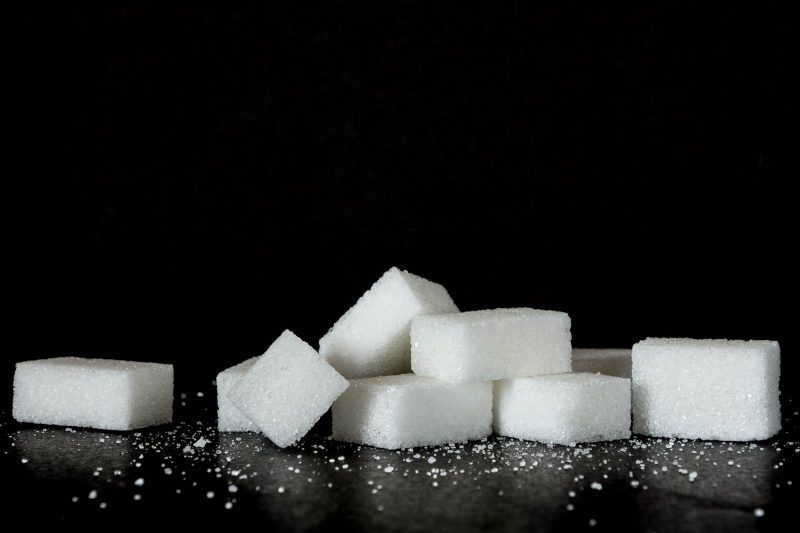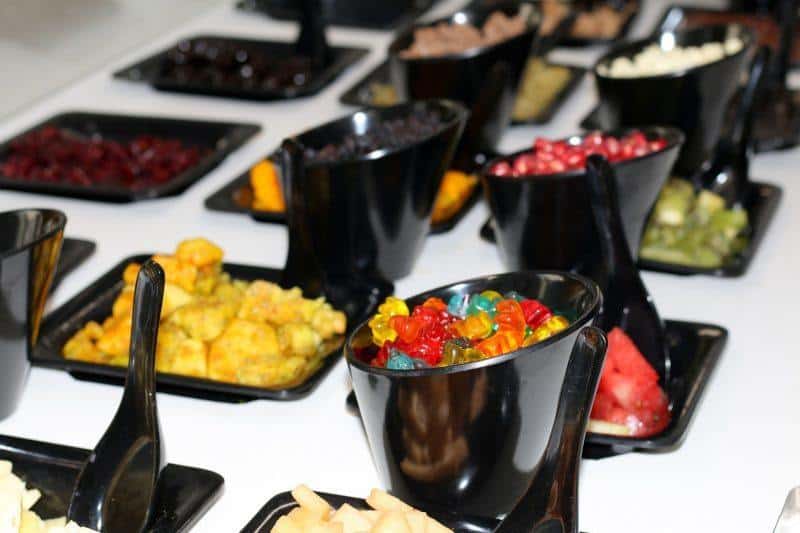If you’re craving for something cool and refreshing on a hot, sunny day, nothing can come close to satisfying your sweet tooth than delicious frozen yogurt. Frozen yogurt or “froyo” is a kind of dessert that is considered to be a healthier alternative to ice cream and other desserts. The frozen dessert is much more than just putting regular yogurt in the freezer and freezing it.

Froyo is a whole lot different compared to regular yogurt and has a completely different nutrition profile. In this article, we will discuss how many carbs are present in frozen yogurt and whether it is a healthier alternative to ice cream or not and how it compares to regular yogurt.
Table of Contents
What’s in Your Froyo?
Frozen yogurt mainly contains milk and milk by-products. Most frozen yogurt manufacturers have their recipes; however, the ingredients common to all frozen yogurts are milk, milk solids, yogurt cultures, sweetener, coloring, flavorings, gelatin and corn syrup.

Sugar or sweetener comprises around 15-17 percent of the froyo and helps to counteract the tartness and also adds flavor, body and thickness to the frozen yogurt. While the Food and Drug Administration (FDA) does not have any specific regulations for frozen yogurt, some manufacturers may add live and active bacteria cultures or probiotics to the froyo.
Frozen yogurt is available in varied flavors and comes in cones, cups, as soft-serves, frozen bars and in cartons. Different frozen yogurt manufacturers use different recipes and ingredients creating frozen yogurts that have varying levels of sweetness or tartness, texture, consistency, flavor and fat content.
How Many Carbs in Frozen Yogurt?
Frozen yogurt’s nutrition profile varies according to the type of milk used to make the froyo and sweeteners and flavorings that are added to it. Frozen yogurt is very yummy because it is quite sweet and usually, the sweetness comes from the sugar that is added to it. Even the fruit-flavored froyo has quite a lot of sugar added to it.

Half a cup of regular, plain yogurt contains around 6g of carbs, whereas, on the other hand, half a cup of frozen yogurt contains around 19g of carbs. The nutrition profile and the carb content of the frozen yogurt will increase depending on the type, as well as the quantity of sugar, fruit or other toppings you put into it.
Frozen yogurt may be considered as a healthier alternative to ice cream because it has lower fat content, but what usually is missed out is the sugar and flavors added to the froyo, which increases the total carbohydrate content of the dessert and typically comprises of sugar. Below are some nutrition facts and how many carbs in frozen yogurt.
Let us take a look at the nutrition profile of 100 grams (3.5 oz) of regular frozen yogurt without any toppings or flavorings in it.
Regular Frozen Yogurt
Below is a comparison of how many carbs in frozen yogurt of different types and quantities.

Popular Kinds of Frozen Yogurt
Regular Frozen Yogurt
1 Scoop (Small)
1 Cup
Low-Fat Frozen Yogurt
1 Scoop (Small)
1 Cup
Fat-Free or Non-Fat Frozen Yogurt
1 Scoop (Small)
1 Cup

Frozen Yogurt (Chocolate)
1 Scoop (Small)
1 Cup
Frozen Yogurt (Soft Serve)
Chocolate Soft Serve Frozen Yogurt (1 Cup)
Vanilla Soft Serve Frozen Yogurt (1 Cup)
Frozen Yogurt Cones — Chocolate Frozen Yogurt Cone (1 Medium Cone Serving)
Frozen Yogurt Cone (Flavor Other Than Chocolate)
Low-Fat Chocolate Frozen Yogurt Cone
Low-Fat Frozen Yogurt Cone (Flavor Other Than Chocolate)

Other Common Types of Frozen Yogurt
Frozen Yogurt (Flavor Other Than Chocolate) (1 Cup – 8fl.oz)
Carob-Coated Frozen Yogurt (1 Bar)
Chocolate-Coated Frozen Yogurt (1 Bar)
Frozen Yogurt Pie (1 Piece – 9” Diameter)
Frozen Yogurt Sandwich (1 Piece)
Frozen Yogurt vs Regular Yogurt, Which Is Healthier?
Including yogurt in your diet can be healthy and nutritious; however, on the other hand, frozen yogurt can contain a lot of added sugar to counteract and reduce its tart and sour taste and make it delicious. Sugar is one of the main ingredients that are critical to the process of manufacturing of frozen yogurt.

Before the yogurt is frozen, sugar is added to the mixture, which helps to prevent the formation of large ice crystals and also ensures that the froyo has smooth and creamy ice-cream-like texture. And so, generally, frozen yogurt contains more added sugar when compared to regular yogurt and this, in turn, causes frozen yogurt to have more carbs.
How Many Carbs in Frozen Yogurt vs Regular Yogurt?
Frozen Yogurt
Plain Yogurt (Whole Milk)
Frozen Yogurt vs Ice Cream, Which Is Healthier?
Frozen yogurt is rather popular because generally, it is considered to be a healthier alternative as compared to ice cream. Frozen yogurt is made using milk and yogurt, while cream is used in making ice cream and so, ice cream has a higher fat content.
However, usually, a lot of sugar is added to frozen yogurt during the manufacturing process in order to improve the taste, as well as the texture of the final product. This adds to the carb content of the frozen yogurt, not to mention it adds to the calories too, which makes up for the lack of fat.
When you have a generous serving of frozen yogurt and add toppings to it including fruit, the frozen yogurt can end up with more carbs and calories when compared to a cup of ice cream. So, you can’t really say that froyo is healthier as compared to ice cream. The idea is to enjoy both frozen yogurt and ice cream as an occasional treat and in moderation.
How Many Carbs in Frozen Yogurt and Ice Cream?
Frozen Yogurt
Ice Cream
In the end, we can conclude that frozen yogurt is a delicious and refreshing dessert; however, to make your froyo healthier, control your portion size, avoid too many unhealthy toppings that pile on the carbs and choose the low-sugar varieties.
